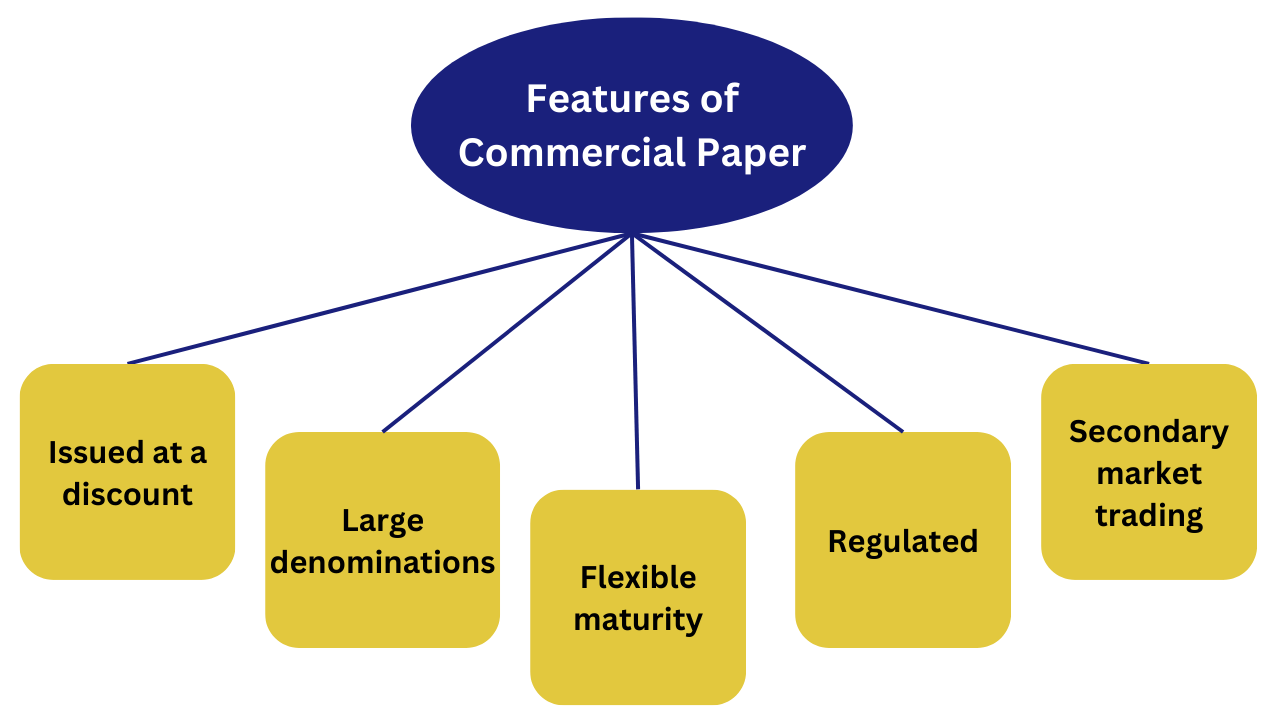Commercial Paper: Definition, Types, and Uses in Business Financing

Definition
An unsecured short-term debt instrument which is issued by corporations is called commercial paper.
Description
Commercial paper was first used during colonial times and was known as a bill of exchange. They became more modern in the 1920s, when New York merchants began selling their short-term commitments to dealers in order to obtain the capital required to pay near-term obligations.
These traders, or middlemen, paid a lower price than the par value for the paper (also known as promissory notes). They subsequently sold the paper to banks and other investors. The merchants would reimburse the investors the par value of the note.
- Companies typically issue commercial paper to cover wages, payables, inventories, and other short-term needs.
- The maturities of commercial paper range from one to 270 days, with an average of roughly 30.
- Commercial paper is issued at a discounted rate and matures at the face value.
- The minimum denomination of commercial paper is $100,000, and it pays a set interest rate that varies with the market.
Advantages of Commercial Paper

- Commercial paper has the advantage of being able to be registered with the Securities and Exchange Commission (SEC) as long as it matures in no more than nine months (270 days).
- This makes it a low-cost and simple method of funding. Although maturities for commercial paper can be as long as 270 days before being subject to SEC oversight, they typically last about 30 days.
- Commercial paper is also less time-consuming and less expensive than obtaining a business loan.
- It provides issuers with cheaper interest rates while offering investors a reduced default risk.
- Commercial paper is an efficient strategy for investors to diversify their holdings.
Difference between commercial paper and certificate of deposit
| Feature | Commercial Paper | Certificate of Deposit (CD) |
| Issuer | Usually issued by corporations or financial institutions. | Typically issued by banks or credit unions. |
| Purpose | Used to meet short-term funding needs, such as financing working capital or covering short-term liabilities. | Used by banks to raise funds or by investors seeking a secure, short-term investment option. |
| Maturity | Can have maturities ranging from a few days to a year. | Maturities typically range from a few weeks to several years, depending on the terms offered by the issuing bank. |
| Liquidity | Generally less liquid compared to CDs. Can be sold in the secondary market but may face liquidity constraints. | Often more liquid than commercial paper, especially if issued by a well-established bank with a strong credit rating. |
| Interest Rate | Typically offers higher yields compared to CDs due to the higher risk associated with corporate issuers. | Generally offers lower yields compared to commercial paper but provides a secure investment option with a fixed interest rate. |
| Risk | Considered riskier than CDs due to the credit risk associated with corporate issuers. | Considered relatively low-risk, especially when issued by reputable banks with strong credit ratings. |
| Regulation | Regulated by the Securities and Exchange Board of India (SEBI) and subject to disclosure requirements. | Regulated by the Reserve Bank of India (RBI) and subject to banking regulations. |
| Minimum Investment | Minimum investment amounts may vary depending on the issuer but are typically higher compared to CDs. | Minimum investment amounts may vary but are generally lower compared to commercial paper, making CDs more accessible to individual investors. |
| Secondary Market | Can be traded in the secondary market but may face liquidity constraints and price fluctuations. | Generally not traded in the secondary market, as they are held until maturity, but can be sold on the open market under certain circumstances. |
| Risk Ratings | Rated by credit rating agencies based on the issuer's creditworthiness. | Issued by banks, which are typically subject to regulatory oversight and credit rating assessments. |
What are the features of commercial paper?

- Issued at a discount: Commercial papers are typically issued at a discount to their face value, and investors receive the face value upon maturity, thus earning a return on their investment.
- Large denominations: They are usually issued in large denominations, making them more suitable for institutional investors than individual retail investors.
- Flexible maturity: One of the critical advantages of commercial papers is their ability to be tailored to the specific funding needs of the issuer. This flexibility is a significant draw for those managing short-term cash flow requirements.
- Regulated: It's important to note that commercial papers are subject to stringent regulation by financial authorities like the Securities and Exchange Board of India (SEBI). This oversight ensures transparency and safeguards the interests of investors.
- Secondary market trading: While commercial papers are typically held until maturity, they can be traded in the secondary market before maturity, providing liquidity to investors. However, liquidity in the secondary market may be limited compared to other securities.
Example
General Electric (GE) is a well-known example of a company that issues commercial paper to meet its short-term financing requirements.
FAQ
What is the commercial paper market?
The commercial paper market is a short-term debt market in which enterprises and financial institutions issue unsecured promissory notes to raise capital for their short-term financing requirements.
What is commercial paper minimum amount?
The minimum investment amount for commercial paper varies according to the issuer and market conditions. However, it is usual for commercial papers to have significant minimum investment requirements, which can range from several lakhs to crores of rupees.
CPs can be issued in values of Rs. 5 lakh or multiples thereof. A single investor should invest at least Rs. 5 lakh (face value).
This makes commercial papers more appealing to institutional investors than individual retail investors. Before investing in commercial paper, investors should consult with the issuer or their financial advisor to determine the exact minimum investment requirements.
Why choose Us?
Filing Buddy is an entity which is focused at providing legal, financial, and corporate and compliances consultancy services to business entities. Our organisation is a structure made of enthusiastics.

EXPERTISE & RELIABILITY
Trusted industry professionals ensuring compliance, accurate tax filing, and comprehensive services for your business needs.

TAILORED SOLUTIONS
Customized services to meet your specific requirements, including business incorporation, trademarks, patents, and seamless GST return filing.

TIMELY SUPPORT
Dedicated support team committed to providing prompt assistance, resolving queries, and ensuring smooth operations for your business.

COMPETITIVE ADVANTAGE
Gain a competitive edge with our comprehensive suite of services, enabling you to focus on growth while we handle your compliance and taxation needs.















.webp)
.webp)

.webp)

